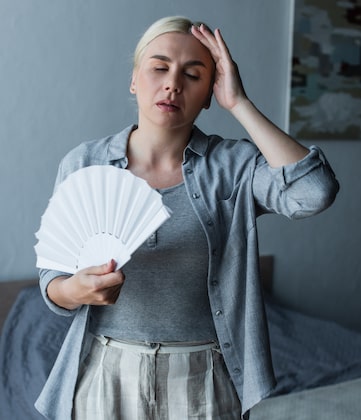Menopause and Hair Loss – Why They are Connected
When the topic of hair loss is discussed among the public, it is usually considered to be a “male condition” since hair loss news and articles are often focused on male patients. This is not always the case as many women also experience female hair loss on the scalp. Even though there are multiple reasons why women can lose their hair, this article will discuss the topic of female hair loss and why it is sometimes connected to menopause.
Menopause and Hair Loss – How it Impacts Hair on the Scalp
 Menopause is often defined as when a woman does not have a menstrual cycle for a period of at least twelve months. However, the changes in the hormones of a female can cause a loss of hair before it is officially diagnosed (perimenopause) as well as long after the menopause process is over (post-menopause).
Menopause is often defined as when a woman does not have a menstrual cycle for a period of at least twelve months. However, the changes in the hormones of a female can cause a loss of hair before it is officially diagnosed (perimenopause) as well as long after the menopause process is over (post-menopause).
The loss of hair from menopause might not be obvious to the patient at first. In general, the first signs of hair loss related to menopause can be rather subtle in nature. These signs can include an increased collection of hair in the shower drain, a need to clean a hairbrush on a more frequent basis, and the discovery of more hair on clothes, pillows, and around the home of the person.
Since the hair loss tends to occur slowly, it can take a little while for the changes in the hairline to be seen in a mirror. Eventually, the female will start to notice thinning patches of hair in the top center of the scalp and also close to the hairline located by the forehead. There have even been instances when the eyebrows and eyelashes start to gain a thinner look and density during menopause.
Menopause and Hair Loss – When Does it Occur During Menopause
While fluctuations in the hormones are the main reason for hair loss that is related to menopause, the loss of hair can happen during any of the three stages of menopause These stages are perimenopause (the time leading up to menopause), menopause (when a woman goes twelve consecutive months without having a period), and post-menopause (from the time menopause is officially diagnosed until the end of life).
During the first stages of menopause, the levels of estrogen and progesterone in the body start to decline. Since these hormones play a part in the promotion of full and dense hair growth, the drop in their level can cause thinning hair on the scalp. In addition, the drop in these hormones also cause an increase in androgens which are male hormones that are also found in smaller amounts in women. Androgens can result in the hair follicles on the head starting to shrink and this results in a hair loss condition known as androgenic alopecia.
Menopause and Hair Loss – How to Treat the Loss of Hair
There are multiple treatment options to address the hair loss associated with menopause. Female patients can use minoxidil on the scalp to promote hair growth in women with female-pattern baldness (which can happen during menopause). The results from minoxidil are not permanent which means the hair will go back to its pre-minoxidil appearance if the patient stops using it on a regular basis.
There are some doctors who perform laser treatment, AKA light therapy, on the scalp. The focusing of low-intensity light to the scalp can trigger a reaction that serves as a signal for the growth of new hair. There is a school of thought that light therapy can increase the strength of the hair as well as the amount of hair follicles. Not all hair restoration specialists perform this treatment option, so patients need to check with their doctor of choice for more information.
The most long-lasting and natural hair restoration option is a hair transplant. If the loss of hair is severe enough, the doctor might recommend a hair transplant where hair grafts are removed from one part of the body and are then implanted into the thinning or balding areas of the scalp. The hair grafts are usually taken from the back and sides of the scalp as the hair in these areas is resistant to balding. The results of a hair transplant are permanent and the hair that is transplanted into the thinning or balding sections of the scalp grow like the hair that is native to the area.
Menopause and Hair Loss – Consult with an Experienced Hair Restoration Specialist
Patients who are not sure if their hair loss is the result of issues related to menopause should schedule a consultation appointment with a doctor who is experienced in diagnosing and treating hair loss on the scalp. The doctor will perform a thorough medical examination of the female patient to determine the reason for the hair loss, the extent of the loss of hair on the scalp, the best treatment option to address the hair loss, and if the person is healthy enough to undergo the recommended medical treatment suggested by the doctor.